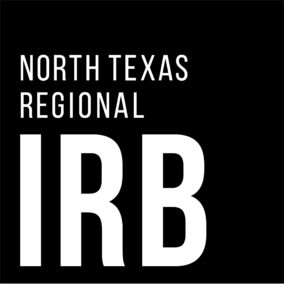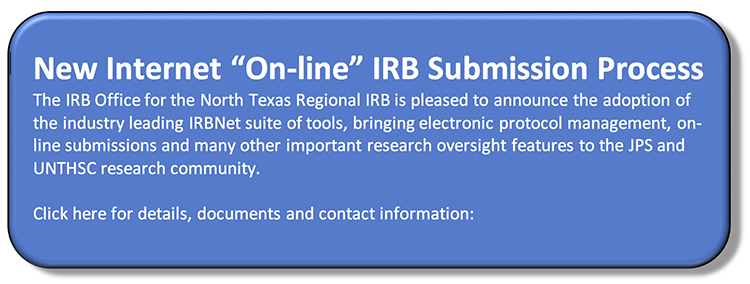 The North Texas Regional IRB is a collaboration involving UNTHSC and the John Peter Smith (JPS) Health Network to provide human subject protection review services to both UNTHSC and JPS researchers…in a single IRB framework. As a Regional IRB, other collaborations are possible throughout the North Texas region, hence the name “North Texas Regional IRB”. As new collaborating partners become involved with the North Texas Regional IRB, announcements will be sent out regarding these new partnerships and opportunities.
The North Texas Regional IRB is a collaboration involving UNTHSC and the John Peter Smith (JPS) Health Network to provide human subject protection review services to both UNTHSC and JPS researchers…in a single IRB framework. As a Regional IRB, other collaborations are possible throughout the North Texas region, hence the name “North Texas Regional IRB”. As new collaborating partners become involved with the North Texas Regional IRB, announcements will be sent out regarding these new partnerships and opportunities.
For additional information about this, please visit our “Frequently Asked Questions about North Texas Regional IRB” (click on the hyperlink). You may also contact us at 817-735-0409.
The North Texas Regional IRB Introduces
the IRBNet User Manual!
In September 2018, the North Texas Regional IRB introduced our new electronic submission system, IRBNet! Over the past year, both the IRB and investigators have worked to become familiar with this system. Based on the knowledge gained, the North Texas Regional IRB has developed an “IRBNet User Manual”. This user manual is designed to assist investigators and study teams in the use of IRBNet. Within this document, researchers/investigators will find step-by-step instructions for registration, initial project submission, and amendments. This document also includes information/guidance on how to complete the Wizard Application Form, in addition to other useful IRBNet tips and tricks.
To access the North Texas Regional IRB’s IRBNet User Manual, please click here:
Change in Federal Common Rule for
Human Subject Research
NOTE: Effective January 21, 2019
The U.S. Department of Health and Human Services and fifteen other Federal Departments and Agencies have issued final revisions to the Federal Policy for the Protection of Human Subjects (the “Revised Common Rule” or “Final Rule”) that went into effect January 21, 2019.
For the most part, this new “Final Rule” on the Protection of Human Subjects (the “Revised Common Rule”) has minor operational differences from the previous rule. Guidance from federal agencies and the North Texas Regional IRB will be forthcoming, and IRB submissions forms have been modified as needed.
Please note that protocols approved by the IRB prior to January 21, 2019 will continue to follow Pre-2018 Requirements (the “Common Rule”). Any protocol approved by the IRB on or after January 21, 2019 will follow the Revised Common Rule (or 2018 Requirements).
For those investigators seeking in-depth information on the various features of this new Common Rule, we have contracted a specific training course at CITI to assist in your understanding of the subtleties and nuances of these changes.
For access to this training course, go to the CITI home page at:
https://about.citiprogram.org/en/homepage
Login as usual, then go to the “North Texas Regional IRB” affiliation (not UNTHSC), click on “View Courses”, then scroll down to “Revised Common Rule”.
As specific support guidance becomes available (from the federal agencies as well as NTR-IRB), we will make announcements to the research community.
Finally, note that this revised Common Rule does NOT impact FDA-regulated research. The FDA has not signed onto the revised rule and still follows pre-2018 regulations.
NEWS: Case Study Reports no longer require IRB review
· Case Study Reports (single subject-patient)
Scholarly activity involving single patient medical record “case study” reports does not require IRB review. Such scholarly activities, although they may be considered as “research” activity, do not meet the federal or university criteria as research activity subject to research subject regulation. Thus, no IRB protocol review and approval is needed for case study reports on a single subject/patient. However, all faculty, staff and students involved in ”Single Patient Case Study” reports must still follow all appropriate professional, institutional and HIPAA regulations and guidelines regarding the management of protected health information. Research projects that involve the use of publicly available data to analyze public figures do not require IRB review.

For information regarding IRBNet, click here.
To get into IRBNet, click here.
NORTH TEXAS REGIONAL IRB
Vision:
The North Texas Regional Institutional Review Board (IRB) will be the premier regional human research protection program and a leading innovator in education, training, and positive “value-added” investigator-IRB relationships.
Mission:
Protect research participants, serve the community, and enhance the human research enterprise of its collaborating partners, currently with John Peter Smith Health Network (JPS) and UNTHSC.
The North Texas Regional Institutional Review Board operates a regional human research protection program to review and approve all research involving human subjects. This program has two important components: the administrative support and outreach regarding the protection of human subjects by the IRB office and the regulatory review and approval provided by the North Texas Regional Institutional Review Board (IRB) itself.
The North Texas Regional Institutional Review Board office conducts initial review for all research projects involving human subjects and refers their findings and recommendation to the North Texas Regional IRB for formal in-depth review and approval. Further the IRB is authorized to monitor all research involving human subjects under their Federal Wide Assurance (FWA) jurisdiction.
The IRB is a volunteer member review committee that is empowered to review all human subjects research proposals – funded or not – which are conducted by UNTHSC and JPS faculty, staff, employees, students, residents, as well as designated community research partners. IRB members are appointed by the Institutional Officials for each partnering member and serve 3-year terms on the Board (renewable). Note that the IRB is essentially an “independent committee” and must follow federal regulations as well as institutional policies in evaluating the scientific and ethical merits of human subject research.
The North Texas Regional IRB is committed to reviewing biomedical and behavioral research involving human subjects under rigorous ethical principles. The IRB has been established to comply with existing regulations of the federal government in accordance with U.S. Department of Health and Human Services (DHHS) regulations in 46 CFR 46, with the Food and Drug Administration (FDA) regulations set forth in 21 CFR 50, 56, and with Federal Wide Assurance (accepted by the DHHS, Office for Human Research Protections (OHRP)).
Further, the North Texas Regional IRBwill adhere to the statement of ethical principles as described in The Belmont Report: Ethical Principles and Guidelines for the Human Subjects of Research found in the Report of the National Commission for the Protection of Human Subjects of Biomedical and Behavioral Research; and the IRB is cognizant of the International Conference on Harmonization Good Clinical Practice Consolidated Guidelines regarding organization and operation of Institutional Review Boards (IRBs).
This fundamental commitment to the protection of human subjects applies to all research involving human subjects regardless of whether the research is funded through government, non-profit or industry sponsors, through University or JPS Health Network funds, or not funded at all, and regardless of the location of the research.
Before any human subject research project is initiated, it must be reviewed and approved by the IRB. While the principal investigator has primary responsibility for the conduct of the study, both UNTHSC and JPS are responsible for protecting the rights and welfare of study subjects under FWAs granted by DHHS to the University. The North Texas Regional IRB and its researchers adhere to federal, Texas, and local regulations and laws as appropriate. Ethical and procedural guidelines by recognized professional organizations are also used for achieving best practices.

This page was last modified on August 30, 2019